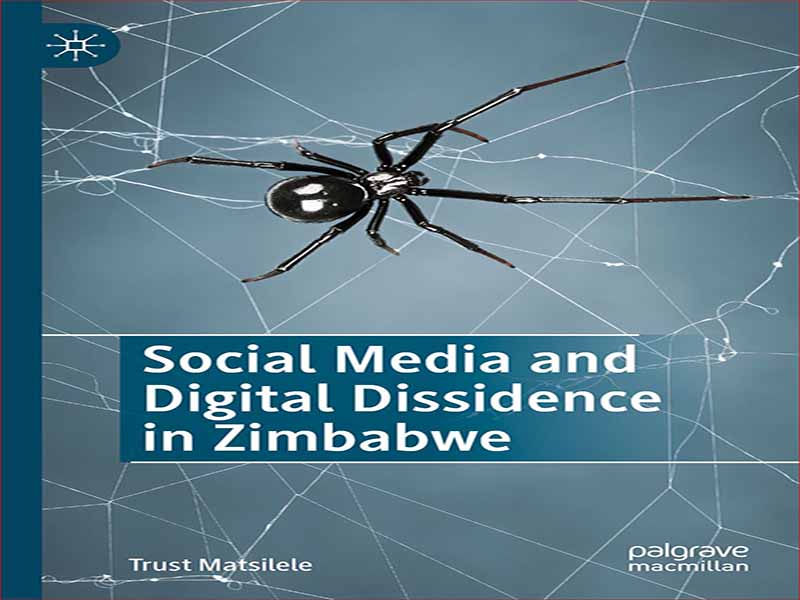- عنوان: Social Media and Digital Dissidence in Zimbabwe
- نویسنده: Trust Matsilele
- حوزه: رسانه های دیجیتال
- سال انتشار: 2022
- تعداد صفحه: 180
- زبان اصلی: انگلیسی
- نوع فایل: pdf
- حجم فایل: 2.87 مگابایت
نارضایتی رسانههای اجتماعی در زیمبابوه با شکل یا اشکال خاص و پیچیدهای از «دگرافکنی» دیجیتالی معاصر دست و پنجه نرم میکند که خود را در کشور آفریقای جنوبی زیمبابوه عمدتاً از طریق رسانههای اجتماعی و نحوه واکنش دولت به چنین نارضایتی نشان میدهد. این شکل خاص از مخالفت که بیشتر در پلتفرمهای رسانههای اجتماعی رخ میدهد، همان چیزی است که این کتاب از آن به عنوان مخالفت رسانههای اجتماعی یاد میکند. رسانه های اجتماعی، یک ابزار ارتباطی نسبتاً جدید – برای مثال در سال 2000 هیچ رسانه اجتماعی به معنای هنجاری وجود نداشت – تا حدی با انعطاف پذیری بالا در دست کاربران تعریف می شود. یکی از این کاربردهای انعطاف پذیر، تبلیغ مخالفت و مخالفت سیاسی است.
در زیمبابوه، «دگراندیشی» یک انجمن اجتماعی، تاریخی و سیاسی بسیار خاص دارد. Chikowero (2015: 4) با نوشتن در مورد اشکال قبلی عدم هویت و نحوه واکنش آفریقایی ها به سلطه استعماری، بیان می کند که آفریقایی ها «به طور مختلف آن طرح های (استعماری) را میانجیگری، تطبیق، تصاحب، مقاومت و واژگونی کردند. بنابراین ارزیابی طرحهای استعماری به طور همزمان رابطه دیالکتیکی بین خشونت استعماری و نبوغ و نوآوری آفریقایی را برجسته میکند و اهمیت زمینه را در شکلدهی به برخوردهای بینفرهنگی آپوریک و گفتمانی تأیید میکند. بنابراین، این بدان معناست که در این کاوش اشکال قبلی اقدامات مخالف، این مطالعه تلاش میکند تا اشکال صریح و ضمنی و اشکال اعتراض درونگرا و برونگرای مردم آفریقا را پیدا کند. این اصطلاح برای اولین بار در زیمبابوه برجسته شد که اقدامات مخربی توسط افراد و گروهها انجام میشد که واکنشهای وحشتزده ایالتها و بازیگران دولتی را برانگیخت. تمرکز بر زیمبابوه با مشاهده این امر تأیید می شود که در حالی که توجه به موارد اساسی مانند قیام بهار عربی یا اعتراضات هنگ کنگ در سال 2019 معطوف شده است، موارد کمتر آفریقایی مانند زیمبابوه، نیجریه، جمهوری دموکراتیک کنگو و آفریقای جنوبی به خودی خود برجسته است و درس های منحصر به فردی ارائه می دهد که به بافت حساس و زمینه خاص است. ایجاد نظریه از جنوب جهانی هدف اصلی این کتاب است.
پژوهش عمومی در مورد مخالفت تمایل دارد بسیاری از اقدامات بسیار متنوع را در طیف گسترده ای از مخالفت دسته بندی کند، و شناسایی دقیق مبهم از آنچه مهم است و به عنوان مخالفت به حساب نمی آید ارائه می دهد. این عدم شفافیت است که تا حدی در این کتاب به بررسی و پرداختن آن خواهم پرداخت. برای مثال، عملی به ظاهر پیش پاافتاده مانند پاشیدن گرافیتی بر روی دیوارها، ممکن است مخالفت تلقی شود، درست مانند مهارت بسیار پیچیده هک کردن سیستم های فناوری اطلاعات (IT) توسط گروهی مانند Anonymous. از سوی دیگر، اقدام بسیار حساس امنیتی افشای اسناد و اطلاعات محرمانه و فوق محرمانه توسط مردخای وانونو از اسرائیل، ادوارد اسنودن و چلسی منینگ در ایالات متحده، نیما فاطمی در ایران و بابا جوکوا در زیمبابوه همگی قابل شمارش است. به عنوان مخالفت نیز. در همین راستا، با استفاده از Tor برای آپلود ناشناس عکسها و اخبار آنلاین، اعتراضات برهنه Pussy Riot در روسیه و سوت زدن توسط Christopher Wylie، Hopewell Chin’ono در زیمبابوه یا Sindiso Magaqa در آفریقای جنوبی نیز به عنوان مخالفت به حساب میآیند. در این کتاب، من به شناسایی خاص پراکسیس دگراندیش و کنش های ارتباطی دگراندیش توسط بازیگرانی که خارج از نقش ها، روابط و موقعیت های هنجاری هنجاری قرار دارند، علاقه مند هستم. این شناسایی و تجلی آن در رسانه های اجتماعی، عمدتا توییتر و فیس بوک، چیزی است که از این مطالعه خبر می دهد.
Social Media Dissidence in Zimbabwe grapples with a specific and complex form—or forms—of contemporary born-digital “dissidence” which expresses itself in the Southern African nation of Zimbabwe largely via social media and how the state responds to such dissidence. This specific form of dissidence that occurs mostly on social media platforms is what this book refers to as social media dissidence. Social media, a relatively recent tool of communication—there was no social media in the norma¬tive sense in the year 2000, for instance—is partly defined by its height¬ened ductility in the hands of users. One such ductile use is the propagation of political dissent and dissidence.
In Zimbabwe, “dissidence” has a very specific social, historical and political association. Writing on earlier forms of dissidentiality and how Africans responded to colonial domination, Chikowero (2015: 4) inti¬mates that Africans “variously mediated, accommodated, appropriated, resisted, and subverted those (colonial) designs. The evaluation of colonial designs therefore simultaneously highlights the dialectical relationship between colonial violence and African ingenuity and innovativeness, and acknowledges the significance of context in shaping the aporic and discur¬sive cross-cultural encounters”. This therefore means in this excavation of earlier forms of dissidence actions, the study attempts to locate both explicit and implicit forms and both introverted and extroverted forms of protest by African peoples. The term first gained salience in Zimbabwean located disruptive acts by individuals and groups that provoked panic responses from the states and state actors. The focus on Zimbabwe is vali¬dated by the observation that while attention has been placed on seminal cases such as the Arab Spring Uprisings or the Hong Kong protests of 2019, less-profiled African cases like Zimbabwe, Nigeria, the Democratic Republic of Congo and South Africa are salient in their own right and present unique lessons that are context sensitive and context specific. Theory building from the global south is a core aim of this book.
General scholarship about dissidence tends to categorise many intermi¬nably varied actions under the wide spectrum of dissidence, rendering opaque strict identification of what counts and does not count as dissi¬dence. It is this opaqueness that I will partly explore and address in this book. For instance, an act as seemingly mundane as spraying graffiti on walls may be considered dissidence, in the same breath as the intensely complex skill of hacking information technology (IT) systems by a group such as Anonymous. On the other hand, the highly security-sensitive act of leaking classified and top-secret documents and information by Mordechai Vanunu of Israel, Edward Snowden and Chelsea Manning in the United States, Nima Fatemi in Iran and Baba Jukwa in Zimbabwe may all be counted as dissidence as well. In the same breath, using Tor to anonymously upload photos and news online, the nude protests by Pussy Riot in Russia and whistle-blowing by Christopher Wylie, Hopewell Chin’ono in Zimbabwe or Sindiso Magaqa in South Africa count, too, as dissidence. In this book, I am interested in the specific identification of dissident praxis and dissident communicative acts by actors located outside normative roles, relations and positions of power. This identification and its manifestation on social media, mainly Twitter and Facebook, is what informs this study.
این کتاب را میتوانید بصورت رایگان از لینک زیر دانلود نمایید.





































نظرات کاربران